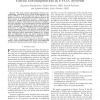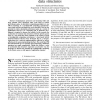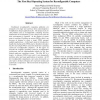131
click to vote
TIM
2010
14 years 8 months ago
2010
Abstract--The most popular representative devices of reconfigurable computing are the Field Programmable Gate Arrays (FPGAs). A promising feature of an FPGA is the ability to reuse...
118
click to vote
IPPS
2010
IEEE
14 years 12 months ago
2010
IEEE
Contemporary processors are becoming wider and more parallel. Thus developers must work hard to extract performance gains. An alternative computing paradigm is to use FPGA technolo...
134
Voted
FPL
2010
Springer
15 years 1 days ago
2010
Springer
Researchers in embedded and reconfigurable computing are often hindered by a lack of suitable benchmarks with which to accurately evaluate their work. Without a suitable benchmark ...
125
click to vote
ERSA
2010
15 years 1 days ago
2010
In this paper, we introduce the open-source PivPav backend tool for reconfigurable computing. Essentially, PivPav provides an interface to a library of digital circuits that are ke...
131
click to vote
TVLSI
2002
15 years 1 months ago
2002
Due to its potential to greatly accelerate a wide variety of applications, reconfigurable computing has become a subject of a great deal of research. By mapping the compute-intens...
125
click to vote
JUCS
2007
15 years 1 months ago
2007
: In this work we present a survey of different papers about reconfigurable computing and its applications. These papers treat very different reconfigurable-computing applications:...
118
click to vote
APCSAC
2001
IEEE
15 years 5 months ago
2001
IEEE
Traditional reconfigurable computing platforms are designed to be single user and have been acknowledged to be difficult to design applications for. The design tools are still pri...
113
click to vote
FPL
2006
Springer
15 years 5 months ago
2006
Springer
In this paper, we present a full-system reconfigurable computing simulation platform intended to promote innovative new research in reconfigurable computing. Currently, reconfigur...
129
click to vote
FCCM
2004
IEEE
15 years 5 months ago
2004
IEEE
It is valuable to identify and catalog design patterns for reconfigurable computing. These design patterns are canonical solutions to common and recurring design challenges which ...





